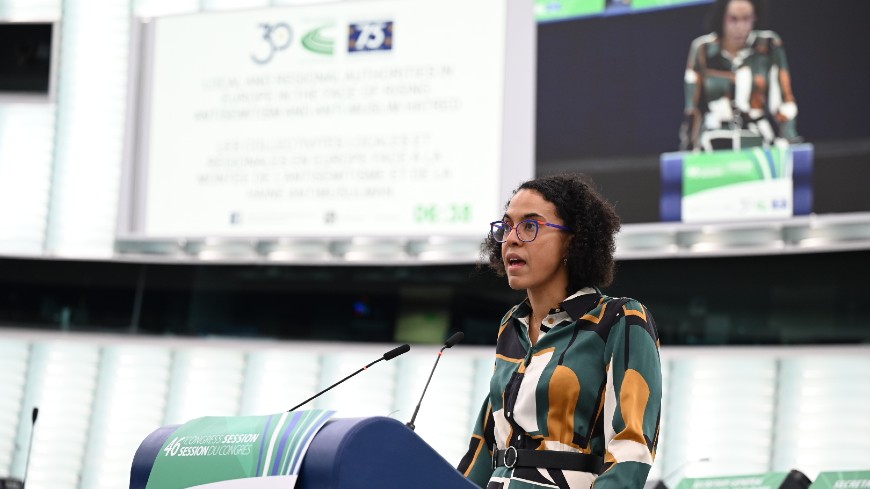The events in the Middle East have led to an unprecedented upsurge in antisemitic and anti-Muslim incidents in Europe. During the thematic debate on 26 March, Congress members shared both recent information regarding their local authorities and also best practices for preventing violence and restoring intercultural dialogue on a lasting basis.
Local and regional authorities are once again on the front line when it comes to addressing daily risks of violence. Social and cultural peace is currently under greater strain than ever in major European cities in which various religious and cultural communities live side by side.
Kaya Comer-Schwartz, Council Leader in Islington, one of the most disadvantaged boroughs in London, highlighted the decisive part which the local council plays in preserving peace and dialogue in an area where over 40% of residents were born outside the UK. As the first Black and Jewish woman to head Islington Council, she is particularly keen to promote respect between the Jewish and Muslim communities there against the background of the current crisis. Never give in to hatred was the approach she had already applied when an anti-Muslim terrorist incident left one person dead and 11 injured during Ramadan in 2017. At the time, the local council took action to prevent the risk of hatred escalating: “Instead of spreading bitterness, the incident further strengthened solidarity between communities in our area. We decided to share iftar – the fast-breaking meal – in public with the Muslim community on the streets of Islington, and we’re going to do that again shortly against the particularly sensitive background of the Israeli-Palestinian conflict. The attack on the illuminations we put up for the Jewish festival of Hanukkah last December also didn’t deter us from repairing the installation the next day through the joint efforts of the representatives of the various communities in our area,” she said. The aim of the policies pursued by Islington Council was to create shared spaces of safety and trust, as dialogue was the only remedy for fear and ignorance.
“In many countries at present, Jews are preparing to leave Europe, and that demands an urgent response,” said Evein Obulor, Director of the European Coalition of Cities against Racism (ECCAR). However, an effective response to rising antisemitism and anti-Muslim hatred required structured approaches and tools capable of measuring the progress of policies implemented by local and regional authorities. ECCAR, which brought together 150 towns and municipalities, therefore offered its members practical roadmaps and toolboxes. Arranging partnerships and cultural events where different communities could share their religious ceremonies in the urban public arena could also help to create spaces of trust and intercommunity dialogue. Through examples of cities such as Heidelberg, Frankfurt and Stockholm, Ms Obulor illustrated the need also to involve representatives of civil society and religious institutions. As stressed by a large number of participants in the debate, specific education was also needed to train the young and old alike to respect and take an interest in the habits and customs of other groups.
Bertil Cottier, President of the European Commission against Racism and Intolerance (ECRI), said that the commission had already sounded the alarm in December and called on European governments to introduce emergency policies to combat the rise in antisemitism and anti-Muslim hatred. Citing ECRI’s reports on Poland and Austria which highlight good practice in this area, he also recalled ECRI’s policy recommendations with a particular focus on Holocaust memorial policies and the prevention of any stigmatization of Muslim officials in administrations. In conclusion, he said that “general indifference is even more dangerous than acts of aggression,” and called for massive involvement of local and regional authorities to combat cultural and religious racism.
Expressing concern at the rise in the far right in many European countries, the Congress representatives underlined the importance of quickly proposing practical solutions in response to those put forward by antidemocratic forces. Referring to the example of the centuries-old coexistence between Muslims, Jews and Christians in his country, the youth delegate from Bosnia and Herzegovina, urged his elders to do their utmost to preserve peace between communities and thereby save nothing less than “Europe’s soul.”
****
46th Session
Agenda – Web file – Photos




